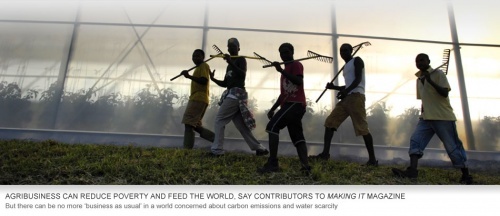

Africa now accounts for about 1 per cent of global manufacturing, and cannot realistically hope to reduce widespread poverty if its governments don’t take effective measures to expand this vital economic sector, says a new report by the United Nations Industrial Development Organization (UNIDO) and the UN Conference on Trade and Development (UNCTAD). The Economic Development in Africa Report 2011, published today, calls for a practical, well-designed approach to industrialization, that is adjusted to specific country circumstances and based on extensive discussion with and feedback from businesses and entrepreneurs. (From UNCTAD Sources)
Labour Intensive Employment:
The report notes that Africa is losing ground in labour-intensive manufacturing – which is generally the entry-level step in industrial development, and is a category especially important in Africa, where jobs are needed in rapidly growing cities. The share of labour-intensive manufacturing activities in manufacturing value-added (MVA) fell from 23 per cent in 2000 to 20 per cent in 2008. However, the report adds that the continent has made some progress in boosting technology-intensive manufactures, such as chemicals. The share of medium- and high-technology activities in MVA rose from 25 per cent in 2000 to 29 per cent in 2008.
Industrial Policy Should be Based on “Hard Learned” Principles:
Africa’s 53 nations vary widely in their levels of industrialization and their recent manufacturing growth performance, the report acknowledges. It says that strategies to spur industrial development – in order to be effective – must be individually tailored by governments. But it recommends that industrial policy should be based on a series of hard-learned principles:
---Supporting – and challenging – entrepreneurs. Government support to private firms is necessary to steer investment and business activities into areas of industry critical for long-term economic growth and employment generation. But such support should not be open-ended. It should be terminated if improved performance – such as the production of competitive export goods – is not achieved within a specified period of time.
---Building effective State–business relations. In the past, government intentions for industry have often not matched the practical conditions experienced by domestic firms and entrepreneurs. For example, employees with the relevant skills may not be available; raw materials may not be obtainable at competitive prices; or banking, financing and technical resources may not be adequate or appropriate. To know what is possible, more consultation is needed with manufacturers or prospective manufacturers. On the other side, government research into possible fields for industrial development may provide useful information to entrepreneurs that enables them to see new opportunities. Industrial policy should be oriented “to encourage search processes by the private sector so that it can discover what can be competitively produced”, the report recommends.
---Focusing on lifting obstacles to industrial development. Consultation with domestic firms, entrepreneurs, and potential overseas investors can pinpoint steps necessary to spur industrial progress. Infrastructure improvements, for instance to roads, railroads, and the electricity supply, may turn out to be vital preconditions for growth in sectors such as labour-intensive manufacturing.
---Putting in place a mechanism for monitoring, evaluation, and accountability. Both broad industrial policy and specific projects should be reviewed, with a critical eye, on a regular basis. Policies and projects seen to be underperforming or failing should be adjusted, based on extensive consultations with the firms concerned, or else terminated.
Agriculture Must be Preserved:
While the report stresses the need to promote manufacturing development, it argues that this must not be achieved at the expense of the agricultural sector. It notes that agriculture has been and will continue to be a major source of revenue, employment, and foreign exchange earnings, in the short to medium term. The study urges African countries to create mutually reinforcing linkages between the agricultural and non-agricultural sectors of their economies.
Steps to Promote Scientific & Technological Innovation:
The report recommends steps to promote scientific and technological innovation and to develop the capability of governments to implement industrial policies.
Currency Exchange Rate Stability:
The study also stresses that industrial policy must be consistent with other macroeconomic policies for better development outcomes. It recommends that African governments avoid exchange-rate overvaluation, that they do more to mobilize domestic resources to fund industrial development, and that they align their monetary and fiscal policies with the objective of industrial development.
Developing Regional Market Relationships”
Other vital ingredients include not only expanded economic relations with neighbouring countries, since regional markets can provide effective pools of customers for manufactured goods, but also political stability, since frequent changes in strategy or policy can disrupt the long-term approaches that work best for expanding industry.
Related Reports at “International Financial Crisis Channel” -
diplomaticallyincorrect.org/c/international-financial-crisis
By Ambassador Muhamed Sacirbey
Facebook – Become a Fan at “Diplomatically Incorrect”
Twitter – Follow us at DiplomaticallyX



